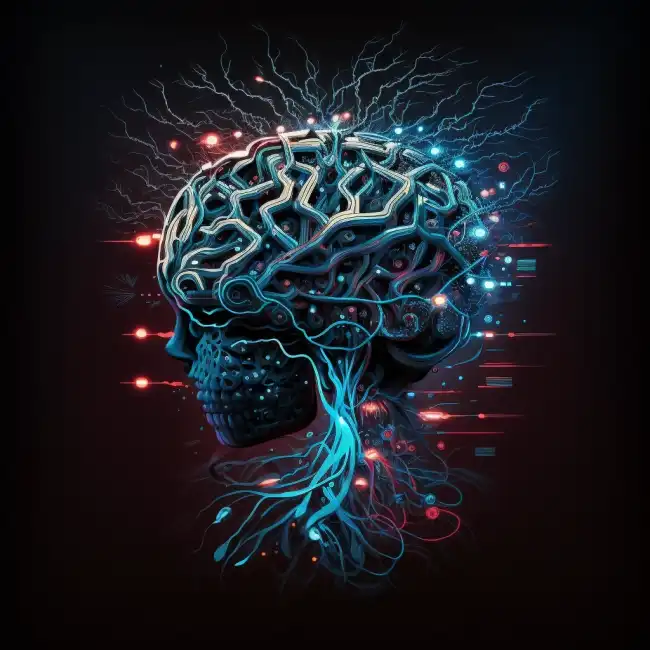Hello, fellow explorers of the mind...
Let me level with you – the philosophy of mind is not even close to my favourite area of philosophy. But I've been forced to examine it in order to reconcile the big questions of consciousness with my preferred system of metaphysics, with existence monism at its core, and questions around consciousness in particular are absolutely fascinating (if complex). I'm also very interested in AI ethics, and consciousness has a big role to play here.
I've skated around the topic of consciousness a few times now while writing, so I thought it was time to dedicate some space to it.
Very roughly, consciousness can be described as our subjective experience, awareness, and perception of the world around us.
It's captivated philosophers, scientists, and thinkers for centuries.
Understanding consciousness would allow us to uncover the inner workings of our own minds and to collapse the mystery that surrounds it. More than that, it would remove the major barrier to other advancements such as brain-computer interfaces and treating diseases related to the mind.
I've written this article as a reasonably partisan overview that starts by interrogating the nature of consciousness, offers a brief history of the salient ideas in this space and then examines our modern theories of consciousness.
Let's get into it.
The Nature of Consciousness
Before we dig in, I want to talk about what we might mean when we say "consciousness". Naturally, there's no consensus on the exact nature of consciousness right now – but we can meaningfully talk about the features of our perceptual experience we want to capture. Let's look at four of what I think are the main facets with some broad brushstrokes.
Subjective experience: I'm talking about the unique, personal sensations and perceptions we have of the world.
Awareness and attention: Our ability to perceive and focus on specific aspects of our environment, allowing us to process and interact with the world around us.
Intentionality: The quality of our thoughts and mental states being directed towards or being about something, such as objects, events, or ideas.
Metacognition and self-awareness: Our ability to think about our own thoughts and experiences, reflecting on our mental processes and understanding ourselves as conscious beings.
We want our theory of consciousness to explain all of these.

Where do we draw the lines of consciousness? Credit: Author, Midjourney
A short history of the philosophy of consciousness
If you study Philosophy, you'll almost certainly have to study Plato and his student Aristotle. They might be considered some of the most famous early debaters of the nature of consciousness. The former saw consciousness as a property of the soul, while Aristotle suggested it arose from brain activity.

In the beginning. Credit: Author, Midjourney
By the Middle Ages, questions about consciousness were often articulated in terms of what became known as the mind-body problem. The mind-body problem asks how it can be possible that the mind – and corresponding mental states – can interact with the body when one seems non-physical and the other seems physical. Two of the most historically salient answers to this are the dualist view, that the mind and body are separate entities; and the materialist view which explains the mind as a function of the body.
The difficulty in explaining our subjective experiences, and how they can arise from purely physical matter (like the brain, or potentially a computer) is called the "hard problem of consciousness" – a term coined by David Chalmers at the close of the 20th century.
Our theory of consciousness should be successful in solving this hard problem.
Neuroscience and consciousness
Let's peek at some neuroscientific and cognitive approaches to consciousness. These two approaches complement each other. They focus on different aspects of consciousness, with neuroscientific approaches shedding light on the brain's biological dances, while cognitive approaches explore mental processes.
I've picked three cutting-edge neuroscientific approaches that are particularly interesting and have a good amount of evidence to back them up.
Integrated Information Theory (IIT)*
I'm fascinated by IIT and make no secret of the fact I'm an advocate. I use IIT to complement my preferred system of metaphysics. I wrote a whole blog about IIT here, if you're interested.
According to IIT, consciousness arises from the integrated information that is generated by the complex interactions between neurons in our brain.
To illustrate, think about waves moving through water. The water is made of H20 molecules, but by themselves, they aren't sufficient to explain the waves. The waves are an emergent property of the water.
In the same way, consciousness is an emergent property of the brain.

Emergent properties. Credit: Author, Midjourney
In other words, our brain creates consciousness through the integration of information. The more integrated the information is, the higher the level of consciousness. Where we draw the line is arbitrary.
In IIT, consciousness is not limited to humans or animals, but could in principle be present in any complex systems, including sophisticated AI programs (very interesting).
It's not without criticism. Some worry, for example, that IIT culminates in panpsychism, where inanimate objects could arbitrarily meet the threshold for consciousness. Heavyweights like Christof Koch fall in this camp. Renowned philosopher of mind Daniel Dennett agrees, but rejects the notion this is a bad thing. Nonetheless, IIT represents a credible, popular and – I think – compelling answer to the question of consciousness.
Neural Correlates of Consciousness (NCC)*
The NCC approach is about searching for clues in specific features of brain activity that link to conscious experiences.
By pinpointing specific regions, networks, or activity patterns, researchers hope to shed light on how our brain conjures up our conscious experiences.
What makes NCC hot property is that it can be tested. It's based on, and motivated by, empirical evidence. NCC research has actually led to the identification of several brain areas and networks that are consistently associated with conscious experiences, improving our understanding of the brain's role in producing these experiences.
There are limitations, though. My big worry about this one (and also, spoiler, the next theory we'll cover) is that it doesn't really level an answer to the hard problem of consciousness. It doesn't explain how and why subjective experience arises from neural activity. It's a bit narrow in scope, mostly focussing on visual awareness and attention, so it doesn't feel like a complete picture.
It's also all very well spotting a correlation, but correlation isn't the same as causation. This makes NCC a bit of a poor contender philosophically – we could end up begging the question with circular reasoning, though I haven't taken the time to examine the argument in strict logical form.
Global Workspace Theory (GWT)*
Imagine your brain as a giant office, with different departments working together, sharing and processing information. That's the idea behind GWT.
It suggests that consciousness arises from this interplay of information across various brain regions, creating a "global workspace" that leads to our conscious awareness. GWT helps us understand how our brain can zero in on specific aspects of our surroundings and experiences.

A global workspace? Credit: Author, Midjourney
GWT does well at explaining how we can focus on particular thoughts or sensory inputs while ignoring others, and it shows how different brain regions contribute to a unified conscious experience. Reassuringly, GWT has also been supported by empirical evidence from brain imaging studies that reveal the involvement of widespread brain networks during conscious processing.
But, just like NCC, it doesn't address the hard problem. The idea of the "global workspace" seems a bit wishy-washy, too, though I've never looked at this one in detail.
*Actually, these theories are sort of cognitive as well – but mostly neuroscientific – never mind
Another perspective – the cognitive angle
No examination of consciousness is complete without looking at the cognitive side of things. Some of the most important concepts in the philosophy of consciousness come from cognitive approaches.
These approaches focus on the mental processes and representations sitting underneath our conscious experiences. I've selected two important cognitive theories that have made notable contributions to our understanding of consciousness.
Higher-Order Thought (HOT) Theory: HOT has a large legacy in philosophy. You can't get through a Philosophy degree without covering it. In HOT, conscious experiences occur when we form "higher-order thoughts" or representations about our own mental states. In other words, we become conscious of a particular experience when we have a thought about that experience. This theory helps explain how we can be aware of our thoughts, emotions, and sensory experiences, as well as why some mental processes remain unconscious.
Attention Schema Theory (AST): Consciousness arises from the brain's representation of attention. Our conscious awareness is a byproduct of the brain's attempts to model and predict the focus of our attention. AST offers insights into the relationship between attention and consciousness and provides a framework for understanding why certain experiences capture our attention while others fade into the background.
Science folks aren't usually keen on cognitive approaches. They can't be empirically tested. They also generally don't do much legwork towards the hard problem either.
But we don't need to pick and choose between neuroscientific and cognitive approaches – they can complement each other. Cognitive approaches explore the mental processes and representations that work hand in hand with neural activity to produce conscious experiences.
Wrapping up
Consciousness is a ride. But as fun as this intellectual adventure is, it's not just about satisfying our curiosity.
Our stance on consciousness shapes how we tackle ethical dilemmas, like AI ethics (and heck, AI ethics needs to catch up fast – it's already a decade or two late.) and how we treat our non-human friends. It also informs the development of potentially awesome technologies, such as brain-computer interfaces. And let's not forget the potential benefits for understanding and treating disorders of consciousness and mental health.
I've tried to present the topic in an unbiased way. For what it's worth, as a reductionist, I reject the notion that there is anything inherently "special" about consciousness. My view is that the threshold for consciousness is arbitrary and that humans tend to overemphasise the distinctiveness of consciousness due to our rich perceptual experience.
In the end, cracking the code of consciousness will allow us to cross a major new frontier of knowledge. That perspective on what it means to be human in this universe is worth waiting for.
Further Reading
An Introduction to the Philosophy of Mind – E. J. Lowe – A book universities make freshers read, and for a good reason – it's a highly readable intro. Sections 2-6 are particularly relevant.
Philosophy of Mind: Classical and Contemporary Readings – David Chalmers. A grand tour of the most important texts in the philosophy of mind. Each section starts with a helpful summary and introduction, which is great as some of the texts are challenging. Section 2 is about consciousness. It's complete with some classics, including Nagel's "What is it like to be a bat?" and Dennett's "Quining Qualia". And Descartes is in there, of course. If you're out of your mind, you can look at the modal argument, which starts with an excerpt from Kripke's "Naming and Necessity", which fried my brain when I was a student and might well finish me off now.
Could AI Ever Be Sentient? – I wrote a blog expanding on the impact our answer to the question of consciousness have on how we think about AI, and what it would mean if it is possible to create conscious AI.



